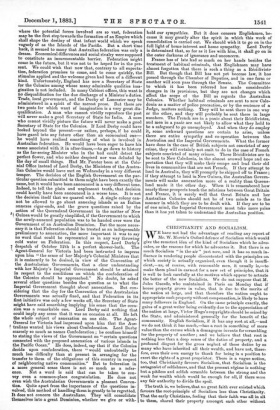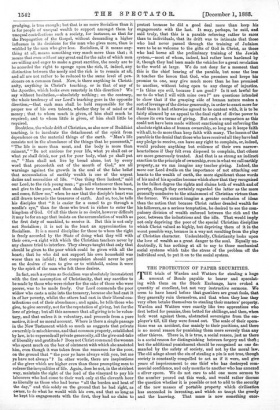CHRISTIANITY AND SOCIALISM.
WE have not had the advantage of reading any report of Mr. W. Morris's Oxford defence of Socialism which would give the remotest idea of the kind of Socialism which he advo- cates, or the reasons for which he advocates it. But there is so
much Socialism "in the air" just now, and it has so much in- fluence in rendering people discontented with the principles on which society is actually organised, even though it is insuffi- cient,—as, of course, with reasonable men, it usually is,—to make them plead in earnest for a new set of principles, that it is well to look carefully at the motives which appear to actuate the better of the new Socialists. We do not suppose that M.
Jules Guesde, who maintained in Paris on Monday that if house property grows in value, that is due to the merits of the nation at large, and that therefore the nation ought to appropriate such property without compensation, is likely to have many followers in England. On the same principle exactly, the gains of a great writer being evidently due to the appreciation of the nation at large, Victor Hugo's copyrights should be seized by the State, and administered generally for the benefit of the community. English Socialism, if it has any root at all,—and we do not think it has much,—has a root in something of more value than the excuse which a demagogue invents for scrambling for the property of another ; and we believe that that root is nothing less than a deep sense of the duties of property, and a profound disgust for the gross neglect of these duties by so many who have inherited all their wealth, and have not, there- fore, even their own energy to thank for being in a position to exert the rights of a great proprietor. There is a vague notion, too, that Christianity favours Socialism, that Socialism is the antagonist of selfishness, and that the present regime is nothing but a pitiless and selfish scramble between the strong and the weak for wealth which would be enough for all, if there were any fair authority to divide the spoil.
The truth is, we believe, that no great faith ever existed which favours the root-principle of Socialism less than Christianity. That the early Christians, feeling that their faith was all in all to them, shared their property amongst each other without grudging, is true enough; but that is no more Socialism than it is for people of unequal wealth to support amongst them by unequal contributions such a society, for instance, as that for the Propagation of the Gospel, without demanding a higher influence in its decisions for the man who gives more, than is wielded by the men who give less. Socialism, if it means any- thing at all, means something very much more than that ; it means that even without any great end for the sake of which men are willing and eager to make a great sacrifice, the needy are to be accorded the right to sponge upon the rich, if, indeed, any distinction between the needy and the rich is to remain at all, and all are not rather to be reduced to the same level of pen- sioners on a common fund. Now, is there anything in Christi- anity, anything in Christ's teaching, or in that of any of the Apostles, which looks even remotely in this direction ? We say without hesitation,—absolutely nothing; on the contrary, the whole tendency of our Lord's teaching goes in the opposite direction,—that each man shall be held responsible for the proper use of his own talents, whether they be of mind or of money ; that to whom much is given, of him shall much be required; and to whom little is given, of him shall little be required.
Doubtless, the whole drift of Christian, as also now of Buddhist teaching, is to inculcate the detachment of the spirit from dependence on the material things of the earth. "Man's life consists not in the abundance of the things that he possesseth," "The life is more than meat, and the body is more than raiment," "Be not anxious for your life, what ye shall eat or what ye shall drink, nor yet for your body, what ye shall put on," "Man shall not live by bread alone, but by every word that proceedeth out of the mouth of God," are all warnings against the growth in the soul of the false belief that accumulation of earthly wealth is one of the urgent duties and necessities of life. "One thing thou lackest," said our Lord, to the rich young man ; "go sell whatsoever thou hast, and give to the poor, and thou shalt have treasure in heaven, and come, follow me," when be saw that the disciple's heart was still drawn towards the treasures of earth. And so, too, he tells his disciples that "it is easier for a camel to go through a needle's eye," than for those who trust in riches to enter the kingdom of God. Of all this there is no doubt, however difficult it may be for an age that insists on the accumulation of wealth as the first duty of mankind, to receive it. But this is not only not Socialism ; it is not in the least an approximation to Socialism. It is a moral discipline for those to whom the right is freely accorded by the State of doing what they will with their own,—a right with which the Christian teachers never by any chance tried to interfere. They always taught that only that should be given to the poor which could be given with all the heart ; that he who did not support his own household was worse than an infidel ; that compulsion should never be put on the desires cf men to give or to withhold, unless it were by the spirit of the man who felt those desires.
In fact, such a system as Socialism was absolutely inconsistent with the first assumption of Christianity, that any sacrifice to be made by those who were richer for the sake of those who were poorer, was to be made freely. Our Lord commends the poor widow who casts a mite into the treasury, because she had cast it in of her poverty, whilst the others had cast in their liberal con- tributions out of their abundance ; and again, he tells those who give, to give secretly, not for the reputation of giving, but for the love of giving; but all this assumes that all giving is to be volun- tary, and that unless it is voluntary, and proceeds from a pure motive, it is of no moral account. Where is there a single passage in the New Testament which so much as suggests that private ownership is mischievous, and that common property, established by law, is to supersede all private generosity, all the give-and-take of liberality and gratitude P Does not Christ commend the woman who spent much on the box of ointment with which she anointed him, even though it was taken from the resources for the poor, on the ground that "the poor ye have always with you, but me ye have not always "? In other words, there are inspirations of the giver which are higher even than those prompting men to redress the inequalities of life. Again, does he not, in the strictest way, maintain the right of the lord of the vineyard to pay his labourers who had come to their work only at the eleventh hour as liberally as those who had borne "all the burden and heat of the day," and this solely on the ground that he had right, as owner, to do what he would with his own, and that so long as he kept his engagements with the first, they had no claim to
protest because he did a good deal more than keep his engagements with the last. It may, perhaps, be said, and said truly, that this is a parable referring rather to mos than to individuals, that its drift was to intimate that those who had never passed through the training of Judaism were to be as welcome to the gifts of God in Christ, as those who had borne all the preliminary training of the Jewish system,—most of whom, indeed, had rather been hardened by it, though they had been made the vehicles for a great revelation to the world at large. We do not deny for a moment that this is the chief bearing of the parable, but none the less it teaches the lesson that God, who promises and keeps his promise to one, may give much more than he has promised to another, without being open to any charge of injustice. "Is thine eye evil, because I am good ? Is it not lawful for me to do what I will with mine own?" are questions intended to show that if the grasping side of human nature makes a sort of leverage of the divine generosity, in order to exact more for itself than it had otherwise agreed to be content with, it is to be fairly silenced by an appeal to the final right of divine power to choose its own terms of giving. But such a comparison as this could not have been made without sanctioning and enforcing the absolute right also of human ownership, so long as it keeps faith with all, to do more than keep faith with many. The lesson of the parable is the denial that those who have received all they have had any pledge to receive, can have any right to complain, or, indeed, would produce, anything but evidence of their own narrow- heartedness if they felt even disposed to complain, that others are more generously treated. And that is as strong an indirect sanction to the principle of ownership, even in what we call earthly property, as we can imagine any teacher giving. Indeed, the more our Lord dwells on the importance of not attaching our hearts to the wealth of earth, the more significant those words of his and of his apostles become which show that they recognised in the fullest degree the rights and claims both of wealth and,of poverty, though they certainly regarded the latter as the mom generally conducive to the attainment of Christian virtues than the former. We cannot imagine a greater confusion of ideas than the notion that because Christ rather dreaded wealth for his followers, as a serious temptation, he desired to see the com- pulsory division of wealth enforced between the rich and the poor, between the industrious and the idle. That would imply not only depriving the poor of the special Christian discipline which Christ valued so highly, but depriving them of it in the worst possible way, because in a way not resulting from the play of Christian character. Undoubtedly, Christianity looks upon the love of wealth as a great danger to the souL Equally un- doubtedly, it has nothing at all to say to those mechanical social systems which take the stress of the problem off the individual soul, to put it on to the social system.







































 Previous page
Previous page